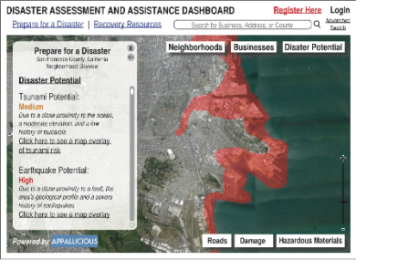The US company Appallicious released on 29 July 2014 the Disaster Assessment and Assistance Dashboard (DAAD), a new cloud-based app that can organize real-time emergency response data across numerous department and agencies. "DAAD is a solution for disaster recovery that pairs local disaster response resources with open data, and offers citizens real-time developments and status updates", said Appallicious’ founder Yo Yoshida according to Emergency Management.
Key features are real-time mapping of relief locations, roadway conditions, weather notifications, and details on hospital and emergency first response centers. Disaster information from more than 100 application programming interfaces (APIs) will be filled with hundreds of data sets to help citizens and emergency crews assess current situations. These include local government resources and data from the Centers for Disease Control and Prevention.
The dashboard also allows residents and city-based companies to post skills and equipment to aid in recovery efforts, helping to organize volunteer services and assistance, such as from companies with heavy machinery and construction equipment. The initiative, endorsed by the Federal Emergency Management Agency (FEMA), aims to empower the citizens to be able to educate themselves to prepare for disasters and respond post-disaster.
After an endorsement by FEMA to be part of its open data initiative, the dashboard was deployed in San Francisco as a pilot. "My goal with this is to house it in every city,” Yoshida said. “And I think every city in the world should have something like this, and if not our product, then something like it.”

